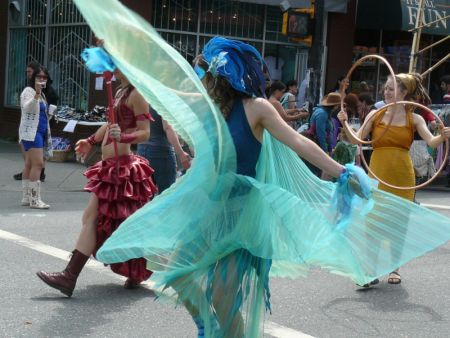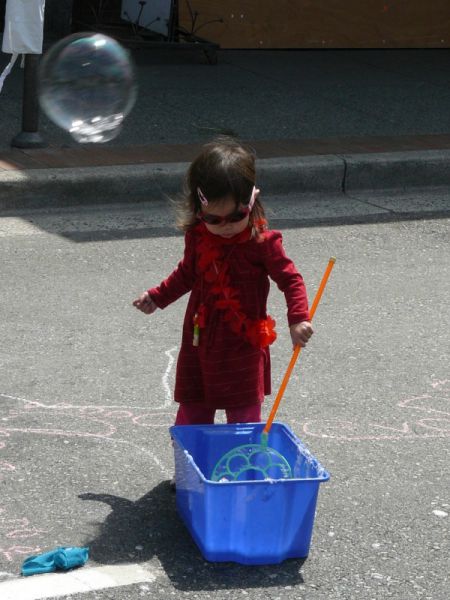STORY about IdeasArtspublié le Juin 17, 2009 by AuroraDiana
Car free day on Commercial Drive
It’s a carnival, a platform for social change, a marketplace, a dance party, a constant barrage of people, movement and activity. But while the festival erupts outside, what do business owners and workers on the Drive see? The street seems to symbolize community and gathering on most days; what does it stand for on an official, city-sponsored pedestrian day? I spoke to some of the people that work hard every day to make Commercial Drive a thriving environment about what they think of cars and the lack of them on this day, and how they envision their community in the future.
One of the first business owners I found was Patrick Iannone, owner of Paranada boutique at Grant.
“It’s a big day,” he started, as he arranged the store’s outdoor vending tables, “I think it’s super important to have these days so that people can see how beautiful this can be.”
While he showed some initial hesitation at the suggestion that the street be closed to traffic at all times, a moment’s thought had him change his mind. “They closed Cambie for two years, close it [Commercial Drive] every Sunday!”
This begs the question: if a major downtown artery can be closed—albeit with much aggravation to us all—could we not also adjust to allowing a few city blocks to be pedestrian-only zones at all times? Amidst the carnival, introducing the viability of such a proposition is, to many, Car Free Day's purpose.
“We’ve always been very supportive,” says Ray Viaud, manager of the People’s Co-op Bookstore at Kitchener, who went on to describe Car Free Day as being a combination of social statement and a celebration of community.
Viaud proposes that the city re-try for a plan that might have made the downtown core a completely different place back in the 1960s: car-free, except for buses, and certain times at which trucks can pass for delivery purposes. He went on to cite several European cities that, despite being bustling centers further inundated by tourists in the summertime, nonetheless manage to remain partially or entirely car-free.
A day spent talking to people on the Drive can indeed be like a fragmented history lesson. Just stroll into Beckwoman’s at Charles street and try getting a few short questions answered. Benita Beckwoman is a veritable Drive mainstay.
“We actually started the Drive!” she says, in response to this allegation, and goes on to reference her involvement in every social movement from the ‘60s to the ‘80s.
But what about the car-free proposition?
“You can’t just jump into something, or take one piece out of the big puzzle. I can’t stop cars. But we live in this incredible society. I can sell you anything I want, but I can also sell you something that makes you think.”
True to her store’s fair trade policy and socially aware energy, she throws back a question instead of an answer.
“It’s not like we need [Car Free Days] to wake people up. They’re woken up. But what do we do now?”
So I skipped forward a few generations and spoke to Tristan Bacon at the Bump ‘n Grind Café at Venables about that very question. He also expressed hesitation—not at the viability of constant car-free status on the Drive—but at the idea of leap frog-like change.
“Vancouver’s going to change when everyone wants change” he told me, though this statement was not intended in a passive way—not at all.
Bacon is a young man who commutes from Lynn Valley to work on the Drive because he loves the sense of community, where, he says, “everyone’s passionate about what they’re doing.”
Bacon went on to describe the positive aspects of the dreaded “r” word—recession—an unfortunately obscure rarity these days.
“The recession has brought buying local to the forefront,” he says, signalling that change—though slow—is steady, and certain.
So perhaps the Car Free Day carnival isn’t radically shifting the urban geography of Vancouver, but “it’s such a good representation of what the world could be without cars,” Bacon says.
How the puzzle pieces will fit together may just be up to us all.
The site for the Vancouver local of The Media Co-op has been archived and will no longer be updated. Please visit the main Media Co-op website to learn more about the organization.


Commentaires
A guerrilla action that became a city-sponsored event
I remember when a handful of radicals first decided to create a car-free Commercial Drive years ago. They organized a street party and threw up makeshift barricades, and a throng of people "occupied" the crosswalk at Grandview Park, walking back and forth until the police threatened to arrest anyone in the crosswalk. Everyone thought these folks were crazy... Good times.